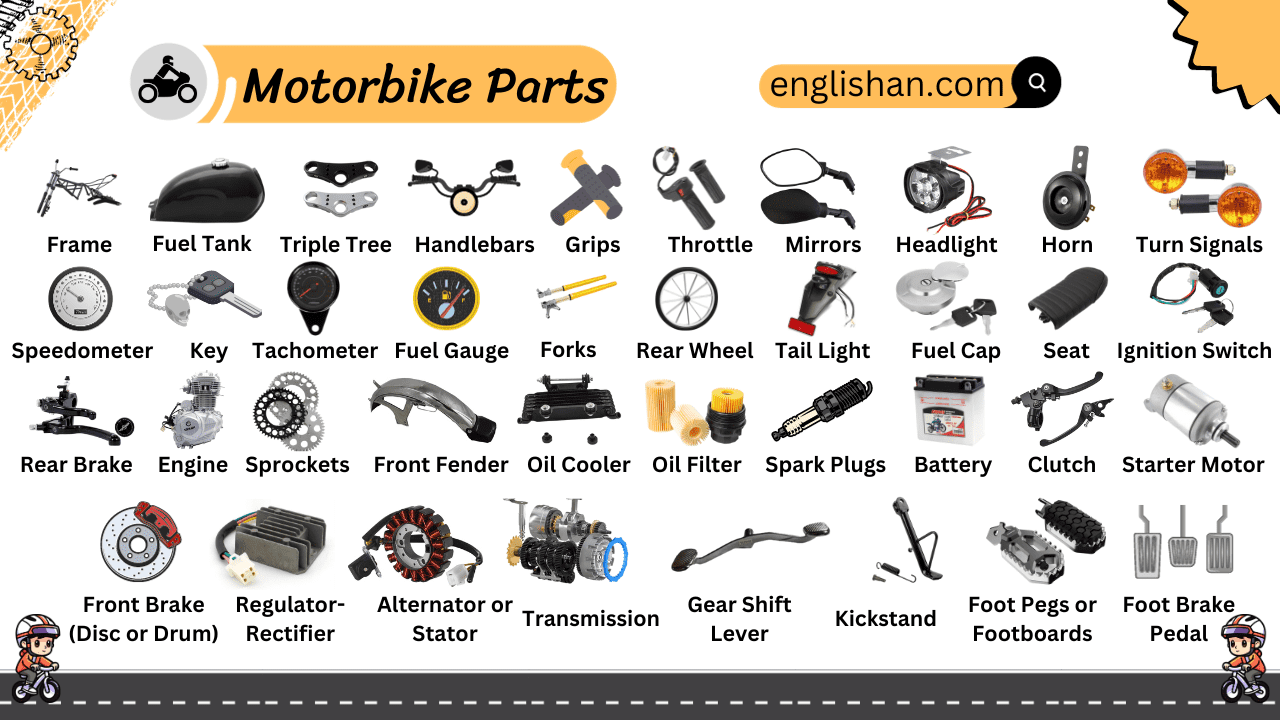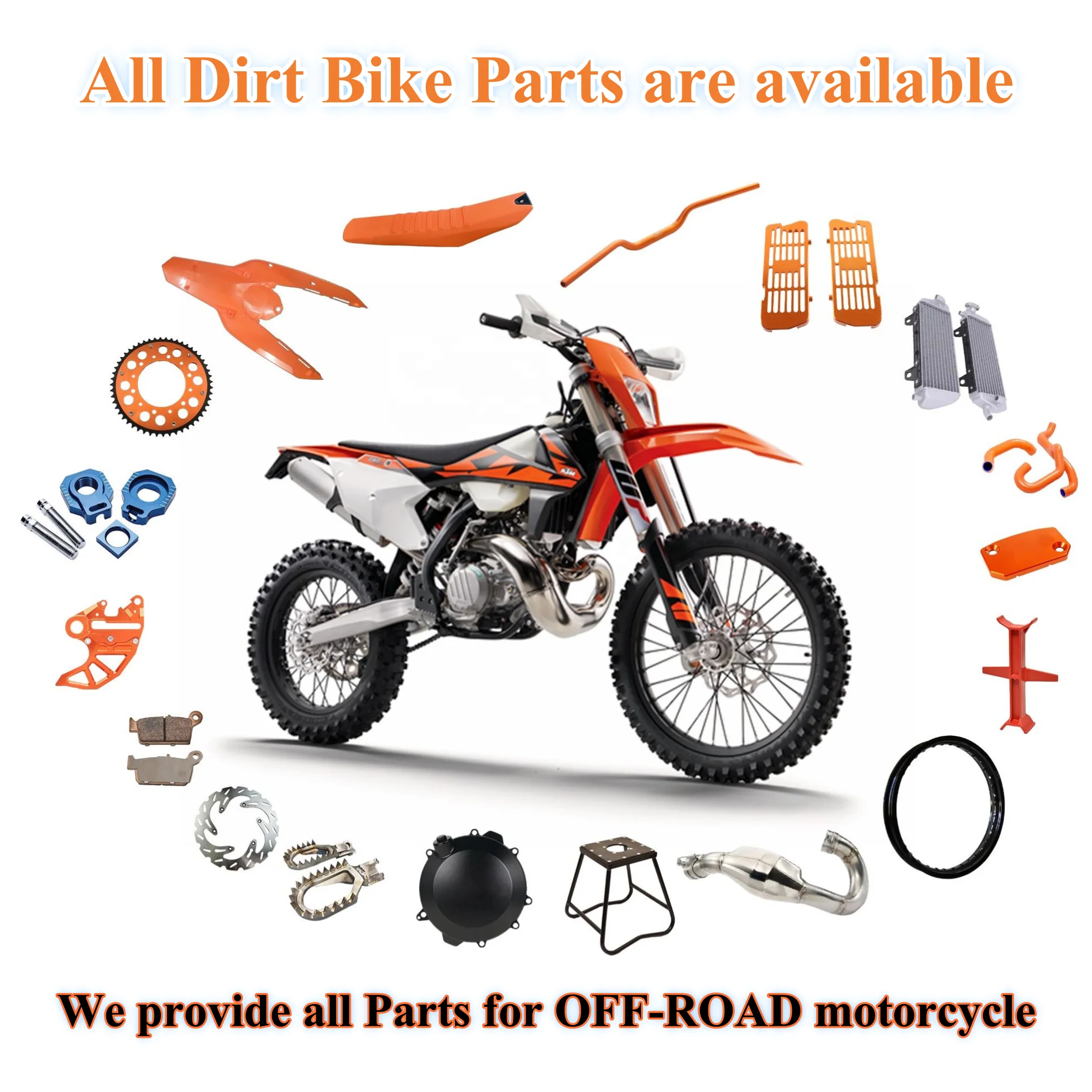Discover the Important MotorBike Parts You Need for Optimum Efficiency
Understanding the important parts of a bike is essential for accomplishing peak efficiency. Each component, from the engine to the stopping system, plays an essential function in overall functionality and safety. Regular maintenance can avoid unanticipated failings and boost the riding experience. However, several motorcyclists ignore the details of these systems. Finding exactly how they collaborate can lead to a more reliable experience. What critical components should every cyclist prioritize?
The Engine: The Heart of Your Motorbike
The engine works as the core part of a bike, driving its efficiency and specifying its capabilities. It is in charge of converting gas into power, which powers the bike forward. Numerous sorts of engines are utilized, including single-cylinder, V-twin, and inline setups, each offering unique features fit for different riding designs and objectives. The engine dimension, typically gauged in cubic centimeters (cc), substantially influences efficiency, with bigger engines generally providing more power and torque.Furthermore, the engine's layout and innovation, such as gas shot systems or air-cooling versus liquid-cooling, impact performance and dependability. Maintenance is crucial for peak procedure; factors like regular oil changes and monitoring ignition system warranty longevity. Bikers often take into consideration an engine's responsiveness and smoothness, as these qualities improve the overall riding experience. Inevitably, the engine stays a critical element that specifies not only the motorcycle's efficiency but also the biker's link to the equipment.
The Transmission: Changing Gears Smoothly
The transmission plays an important function in a motorcycle's performance, especially in the mechanics of gear shifting. Comprehending just how to change gears efficiently can enhance the overall riding experience, while normal maintenance warranties peak capability. Correct focus to these elements can significantly affect the durability and performance of the bike.

Gear Shifting Mechanics
Smooth equipment moving is important for optimal motorbike efficiency, substantially affecting both velocity and control. The mechanics of equipment shifting involve the communication between the clutch, equipment bar, and transmission system. When a rider involves the clutch, it disengages the engine from the transmission, permitting a gear change without harming the parts. A well-timed release of the clutch, incorporated with specific activity of the gear lever, promotes a seamless change in between gears. This process guarantees that the engine runs within its finest power band, enhancing efficiency. Motorcycle Parts Auckland. In addition, comprehending the gear proportions and their result on rate and torque can help motorcyclists make educated options during shifts, inevitably adding to an extra enjoyable and responsive riding experience
Upkeep Tips Importance
Regular upkeep plays an important function in assuring that the transmission system runs efficiently, permitting smooth gear shifts. Routinely inspecting and changing the transmission liquid is vital, as old fluid can lead to increased friction and wear. In addition, examining the clutch for wear assurances peak involvement and disengagement, preventing slippage throughout gear changes. Lubrication of moving parts is similarly essential to decrease rubbing and enhance efficiency. Motorcycle owners ought to likewise keep track of for leakages and unusual sounds, as these can suggest underlying issues. By adhering to these maintenance suggestions, riders can lengthen the life expectancy of their transmission system, guaranteeing that gear changes stay seamless and adding to the overall efficiency of their motorbike.
The Braking System: Ensuring Safety And Security on Every Adventure
Braking systems are basic parts that straight influence a motorbike's security and efficiency. They contain various components, including brake pads, blades, calipers, and hydraulic lines, all interacting to guarantee reliable deceleration. The kind of braking system-- typically either disc or drum-- influences responsiveness and quiting power.Regular maintenance is necessary to maintain peak performance; worn brake pads can cause lowered effectiveness and increased quiting distances. Furthermore, the quality of brake liquid ought to be monitored, as it can absorb dampness with time, compromising braking efficiency.Riders should also consider the value of anti-lock stopping systems (ABS), which avoid wheel lockup during sudden stops, improving total safety. Properly functioning brakes are not simply about stopping; they impart confidence in the motorcyclist, permitting more secure navigation with different terrains. Inevitably, a trusted braking system is crucial for delighting in every trip with comfort.
The Suspension: Enhancing Convenience and Control
A well-functioning suspension system considerably contributes to a motorcycle's total efficiency, enhancing the effectiveness of the stopping system. The suspension plays a considerable role in taking in shocks from unequal surface areas, ensuring a smoother trip while maintaining tire contact with the roadway. This contact is vital for both stability and control, allowing motorcyclists to browse corners with self-confidence and precision.Different kinds of shock absorber, such as telescopic forks or mono-shocks, provide varying degrees of convenience and handling. Properly tuned suspension improves responsiveness, providing the motorcyclist with a more you can try these out linked feel to the motorbike. Routine upkeep checks are necessary to identify the suspension parts, consisting of dampers and springtimes, are working at their best. An effective suspension system not only raises the riding experience however additionally contributes to the longevity of other motorcycle components by reducing deterioration. Therefore, purchasing top quality suspension is crucial for any type of significant motorbike enthusiast.
The Tires: Attaching You to the Roadway
Tires play a vital function in a motorcycle's performance, functioning as the main link in between the roadway and the cyclist. Recognizing the different kinds of tires available can greatly affect dealing with and safety. Additionally, routine upkeep is important check this to guarantee peak tire efficiency and longevity.
Tire Enters Explained
How do different tire types influence a motorbike's performance? Tire types play a crucial role in figuring out a motorbike's handling, hold, and security. Sporting activity tires, created for high performance, deal enhanced traction and responsiveness on smooth roadways, making them ideal for racing and hostile riding. On the other hand, touring tires focus on longevity and convenience, offering a smoother experience for long-distance traveling. Off-road tires, identified by their tough step patterns, master traction on unpaved surfaces, suitable for journey enthusiasts. Additionally, dual-sport tires mix features from both on-road and off-road categories, accommodating versatile riding demands. Ultimately, picking the best tire type is crucial for enhancing efficiency, ensuring safety and security, and improving the total riding experience.
Upkeep Tips Offered
While riding when traveling, preserving suitable tire problem is crucial for safety and performance. Regularly examining tire stress is necessary, as under-inflated tires can cause poor handling and enhanced wear. It is a good idea to evaluate step depth often; used tires compromise grip and stability. On top of that, motorcyclists must search for indicators of damages, such as cracks or lumps, which can show the requirement for replacement. Rotating tires periodically guarantees even use, improving longevity. In addition, keeping tires tidy from debris and avoiding extreme curbs can lengthen their life expectancy. Finally, keeping correct positioning and balance adds to come to a head efficiency, reducing stress on various other bike components. Complying with these maintenance tips will substantially improve the general riding experience.
The Fuel System: Fueling Efficiency and Efficiency
The fuel system plays an essential duty in making best use of a motorbike's performance and effectiveness, as it ensures the optimum shipment of fuel to the engine. It comprises a number of critical elements, including the gas tank, fuel pump, fuel filter, and fuel injectors or carburetor. Each part should function effectively to guarantee a smooth and powerful ride.The gas tank shops fuel and supplies it to the engine via the fuel pump, which generates the needed stress. A fuel filter protects against contaminants from getting in the engine, while the injectors or carburetor mix fuel with air for combustion.Proper maintenance of the fuel system is important; a stopped up filter or malfunctioning injector can cause decreased efficiency and raised gas consumption. By confirming that the fuel system runs successfully, bikers can delight in improved throttle action, much better fuel economic climate, and in general enhanced riding experience.
The Electrical System: Powering Your Adventure
A reliable electrical system is important for the total capability and safety and security of a motorbike, as it powers essential parts such as the ignition, illumination, and different digital systems. This system includes the battery, which stores energy, and the alternator, in charge of creating power while the engine runs. The electrical wiring harness connects these components, making sure reputable power distribution.Additionally, fuses shield the system from overloads, while relays assist regulate high-current gadgets with low-power signals. A properly maintained electric system enhances efficiency by guaranteeing smooth beginnings and constant operation of signals and lights, important for cyclist visibility and safety.Regular checks of the battery's fee and links are essential for preventing electric failures. Cyclists must also evaluate wiring for wear and tear, guaranteeing all components function preferably. Inevitably, a durable electrical system contributes substantially to the total performance and integrity of the motorbike.
Often Asked Inquiries
Just how Commonly Should I Change My Motorcycle's Battery?
The regularity of motorcycle battery substitute depends on usage and upkeep have a peek at this site (Motorcycle Parts Auckland). Normally, batteries must be changed every three to five years. Normal checks can help determine when a replacement is needed for peak efficiency
What Devices Do I Need for Standard Motorcycle Maintenance?
For standard bike upkeep, one requires vital devices such as a socket set, wrenches, screwdrivers, pliers, tire stress scale, and a torque wrench. These devices help with efficient upkeep and ensure the motorcycle runs efficiently and safely.
Just How Can I Enhance My Bike's The rules of aerodynamics?
To improve motorcycle the rules of aerodynamics, one should take into consideration readjusting fairings, making use of windshield extensions, optimizing body position, and decreasing general weight. These alterations assist decrease drag, boosting security and gas efficiency throughout adventures.
What Are the Signs of a Failing Electric System?
Indications of a falling short electric system consist of dimming lights, problem beginning, irregular tool readings, and blown integrates. Motorcycle Spares Christchurch. Uncommon scents or deterioration around battery terminals might also show underlying problems needing instant interest for safety and efficiency

Exactly how Do I Select the Right Oil for My Motorbike?
When selecting oil for a motorcycle, one must think about the producer's specifications, viscosity ratings, and the kind of riding. In addition, standard versus synthetic oil can impact efficiency and engine defense, affecting the choice greatly. The engine dimension, commonly gauged in cubic centimeters (cc), considerably affects efficiency, with larger engines normally supplying more power and torque.Furthermore, the engine's style and technology, such as gas injection systems or air-cooling versus liquid-cooling, affect performance and reliability. A well-functioning suspension system substantially adds to a motorbike's total performance, complementing the performance of the braking system. The fuel system plays an essential function in making the most of a motorbike's efficiency and effectiveness, as it guarantees the optimum delivery of gas to the engine. A fuel filter avoids pollutants from entering the engine, while the injectors or carburetor mix gas with air for combustion.Proper maintenance of the gas system is vital; a blocked filter or malfunctioning injector can lead to lowered efficiency and boosted fuel usage. A well-kept electrical system enhances efficiency by guaranteeing smooth beginnings and consistent operation of lights and signals, crucial for rider exposure and safety.Regular checks of the battery's charge and links are important for avoiding electric failures.